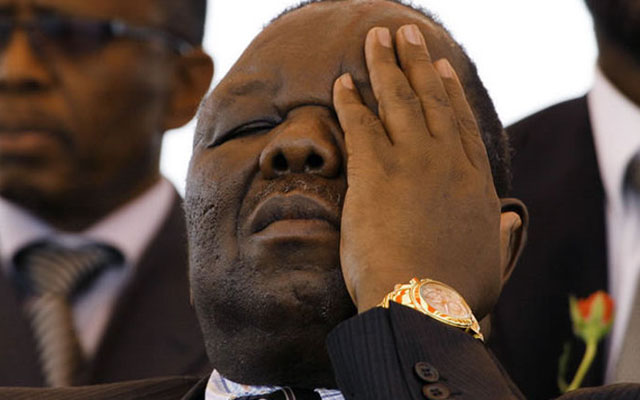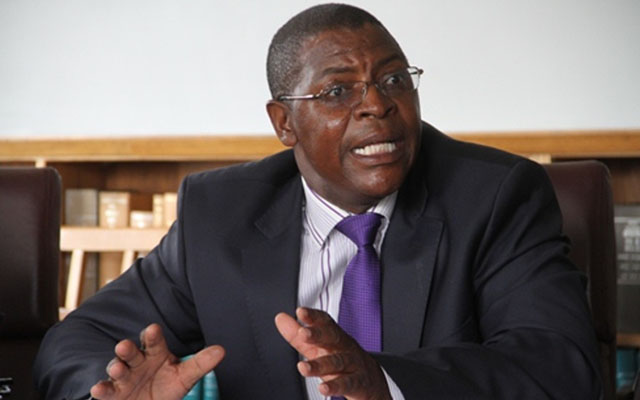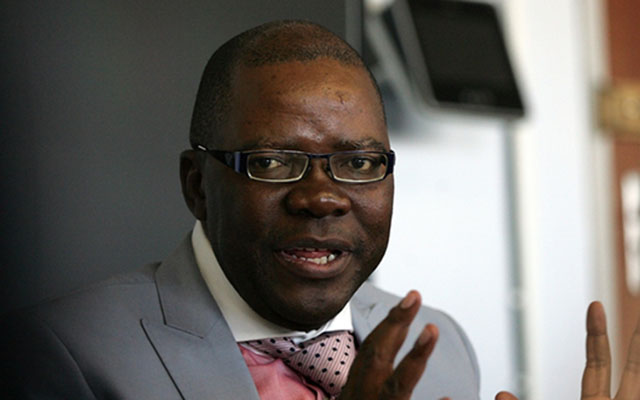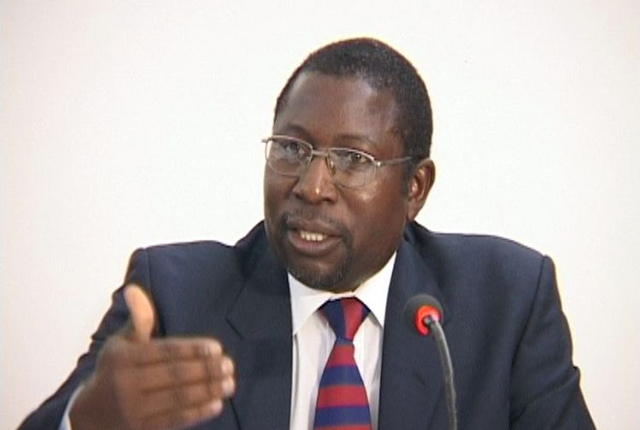A coalition of zeroes

MDC-T leader Morgan Tsvangirai last week formed an alliance with six other smaller political parties. The coalition will operate under the banner of MDC Alliance, with Tsvangirai as its leader. President Mugabe has called the coalition a coming together of “political zeroes, no matter how many zeroes you try to put together, they never constitute a unit, they remain zeroes”. Our Assistant Editor Lovemore Chikova takes a look at each of the seven political zeroes and demonstrates that President Mugabe’s observation was indeed correct.
Morgan Tsvangirai
That Tsvangirai is an election perennial loser is an undisputed fact. Since the formation of the MDC, before the numerous splits that left the opposition party resorting to Tsvangirai’s name to distinguish itself from its splinter groups, the party has been struggling to make a mark on the political scene.
In fact, one of the major reasons for the splits in the MDC has been attributed to Tsvangirai’s losing streak and his dwindling support base.
The MDC-T in its form today has been making suicidal political decisions that have contributed to its supporters beginning to doubt the pedigree of its leaders.
One such decision is the party’s resolve not to contest by-elections after its dismal performance in the 2013 elections.
Tsvangirai’s party managed 70 National Assembly seats in the 2013 harmonised elections, compared to Zanu-PF’s 196.
Two seats are held by Welshman Ncube’s MDC, while the other two were won by independents.
In his attempt at the presidential post in 2013, Tsvangirai managed 1 172 349 votes (34,94 percent of the vote), compared to President Mugabe who garnered 2 110 434 votes (61,09 percent of the vote).
Since then, President Mugabe has been gaining more popularity, as evidenced by the oversubscribed Presidential Youth Interface Rallies he is holding throughout the country.
On the other hand, Tsvangirai recently went throughout the country where he addressed paltry crowds, in some instances less than 200 people.
As it stands now, MDC-T should be cursing its self-defeating decision to boycott the by-elections.
Tsvangirai expelled nearly 20 legislators who had aligned themselves with the revolt by the party’s secretary-general Tendai Biti.
The resultant by-elections were all won by Zanu-PF.
Tsvangirai has also made his life difficult within his party by not consulting on the coalition.
His supporters, led by those in the Matabeleland region, are up in arms and brewing another devastating revolt against Tsvangirai’s dictatorship with regards to the formation of the alliance.
The recent assault of the party’s vice president Thokozani Khupe and two other senior leaders in Bulawayo demonstrates how desperate Tsvangirai is to retain support.
Tsvangirai enters this coalition faced with the reality of a split within his party.
In fact, sources say one of the items on the agenda of the meeting in Bulawayo that was disrupted by the youths from Harare was to do with the alliance.
Khupe and company are making thinly veiled threats to withdraw the little support that Tsvangirai has been enjoying in Matabeleland.
That Tsvangirai no longer appeals to Zimbabweans is a fact supported by recent credible research.
Afrobarometer released its research recently indicating that the former trade unionist will not win an election any time soon.
His background as a politician does not do him any favour at all.
Who can forget Tsvangirai’s bedroom antics that earned him the famous description: “Tsvangirai’s open zip and shut mind policy”.
Apart from his loose loins, Tsvangirai is now widely viewed as a notorious dictator within his party and by outsiders.
In fact, Tsvangirai has demonstrated so many weaknesses as the MDC-T leader to an extent that many Zimbabweans doubt the sincerity of his partners in making him leader of the alliance.
Professor Welshman Ncube
A political analyst once retorted that Prof Ncube would serve himself best by going back to the university lecture theatre on a full- time basis and leave politics to politicians.
Well, to some extent the analyst was right.
Prof Ncube has made numerous blunders as a politician and the biggest of them all was to move out of the main MDC and form his own MDC-N splinter.
What value will Prof Ncube bring to the alliance, except perhaps offering legal advice?
MDC-N is just a political party in name, it does not have the numbers.
In the 2013 presidential elections, only 92 637 people (2,68 percent of the vote) out of the millions of voters thought it worthwhile to cast their vote for him.
What makes Prof Ncube’s political career more laughable is that out of the scores of parliamentary candidates his MDC-N party fielded in the 2013 harmonised elections, none of them won.
The two seats his party holds in the National Assembly are a result of the new Constitution’s benevolence which advocates for proportional representation for women.
It appears that Prof Ncube’s political suicide came when he decided to dump the main MDC together with the party’s late vice president, Gibson Sibanda.
The two soon found themselves in a political wilderness.
Prof Ncube exhibited his political bankruptcy by inviting Professor Arthur Mutambara to lead their new party ahead of the 2008 harmonised elections.
The party contested the elections under the name Movement for Democratic Change Mutambara.
That alone makes many voters doubt Prof Ncube’s pedigree in the MDC Alliance.
His record in the Government of National Unity when he bungled the Ziscosteel deal as Minister of Industry and Commerce will also haunt him for many years to come.
Tendai Biti
His profession as a lawyer has always been overshadowed by his clownish behaviour on the political field.
Biti has gained notoriety for being foul-mouthed.
He is a man who does not mince his words when it comes to vulgar language, even if he is speaking on record.
Many thought his “uncultured” tongue would change when he became the Minister of Finance in the Government of National Unity from 2009 to 2013.
But it turned out to be the opposite, he actually seemed to be getting worse.
He is a guy who has failed to graduate from the mentality of a stone-throwing university student to a mature politician.
Just like his erstwhile colleague Prof Ncube, Biti has remained in the shadows of Tsvangirai since his breakaway from MDC-T together with Elton Mangoma.
Biti and Mangoma formed a political outfit they named MDC Renewal, which seemed to exist only in name.
To show that they had renewed nothing, Biti and Mangoma were soon at each other’s throats, leading to yet another split.
Biti formed the People’s Democratic Party, while Mangoma opted for his own Renewal Democrats of Zimbabwe.
There is no doubt that Biti’s support base has been dwindling since he left the MDC-T and MDC Renewal.
It is a fact that Biti, just like Prof Ncube, joins this alliance with a weaker support base.
By joining the alliance, it is just as good as Biti returning to the MDC-T, a subtle admission he failed to make it on his own.
Jacob Ngarivhume
When it was announced that this man would be part of the MDC Alliance, many MDC-T supporters should have asked: Jacob who?
Of course, Ngarivhume of Transform Zimbabwe party also appended his signature on that MDC Alliance agreement.
The economic crisis caused by sanctions imposed on Zimbabwe by Western countries bred some individuals who thrive on sourcing money from external donors in the name of attempting to remove the Government.
Ngarivhume is one such person.
He started off by forming an organisation he called Voice for Democracy, but foreign donors soon saw through his intentions.
Funding dried up.
Not the man to give up in pursuit of making a few dollars from the gullible Western donors, Ngarivhume abandoned Voice of Democracy and formed Prayer Network Zimbabwe.
Through this organisation, he coerced a few foreign Christian donors to come on board.
They too soon found out the futility of funding a one-man organisation.
That was when Ngarivhume decided to venture into the political arena and formed Transform Zimbabwe in 2008.
The party has been fielding candidates in by-elections, especially after the 2013 harmonised elections.
The results speak for themselves.
In parliamentary by-elections held in 2015, Transform Zimbabwe got 38 votes in Makokoba, 178 in Dzivarasekwa, 26 in Kuwadzana, 32 in Dangamvura-Chikanga, 116 in Highfield and 87 in Mbizo.
With such a dismal record, it is obvious that Ngarivhume does not have the numbers and will not add any value to the alliance.
Agrippa Mutambara
The former ambassador wrestled the Zimbabwe People First party first from former Vice President Joice Mujuru and then from former Zanu-PF Politburo members Didymus Mutasa and Rugare Gumbo.
As things stand, it is not clear which other people are part of Mutambara’s Zimbabwe People First.
The inclusion of Mutambara in the coalition casts doubt on the MDC-T researchers, unless it is a deliberate effort to add more zeroes to the alliance.
It is not surprising that Mutambara came virtually alone for the signing ceremony at Zimbabwe Grounds, in sharp contrast to his colleagues who brought a few supporters.
In all fairness, Mutambara has nothing to offer to the alliance, expect perhaps his experience as a diplomat.
Mathias Guchutu
Guchutu is really an interesting character.
He is known in some circles as a freelance journalist and a self-imposed representative of teachers and lecturers.
Many were taken by surprise to see him appending his signature on the agreement at the alliance formation rally.
He has been a jack of all trades with a penchant for wearing so many hats at the same time.
Guchutu held the post of secretary-general of the National Association of Freelance Journalists and is also the secretary-general of the National Education Union of Zimbabwe.
He then seized leadership of the Multiracial Christian Democrats party following a vacuum created by the departure of founding leader Reverend Gerald Mubaiwa, who left the country a few years ago.
Very few Zimbabweans know who Guchutu is in politics, let alone what he represents.
Yet he is now being touted as an important member of the alliance and is expected to bring his supporters!
His presence on the MDC Alliance line-up is a true reflection that the coalition is made up of zeroes and come 2018, the sum total will be nothing but a huge circle.
Denford Musiyarira
The Zanu-Ndonga leader assumed leadership of the party in 2015 after the then leader Wilson Khumbula announced that he had dissolved the party.
Khumbula had taken over following the death of the Reverend Ndabaningi Sithole in 2000.
Khumbula said the reason for the party’s dissolution was that he was joining Zanu-PF.
In reality, the main reason of the dissolution was lack of support for the party.
Musiyarira inherited Zanu Ndonga in name only, without any supporters.
Before then, the party had been rocked by divisions and split into two, with one faction led by Khumbula and the other by Gondai Vutuza.
Another splinter group soon emerged led by Reketayi Semwayo.
Zanu-Ndonga has never made an impact on the local political scene, except holding one seat in Chipinge, which it lost in 2005 and never recovered it.
It is clear that Musiyarira has been struggling to ensure that Zanu-Ndonga gets supporters, even in its former stronghold in Chipinge.
The party now exists in name only.
Musiyarira comes to the MDC Alliance empty-handed.












Comments